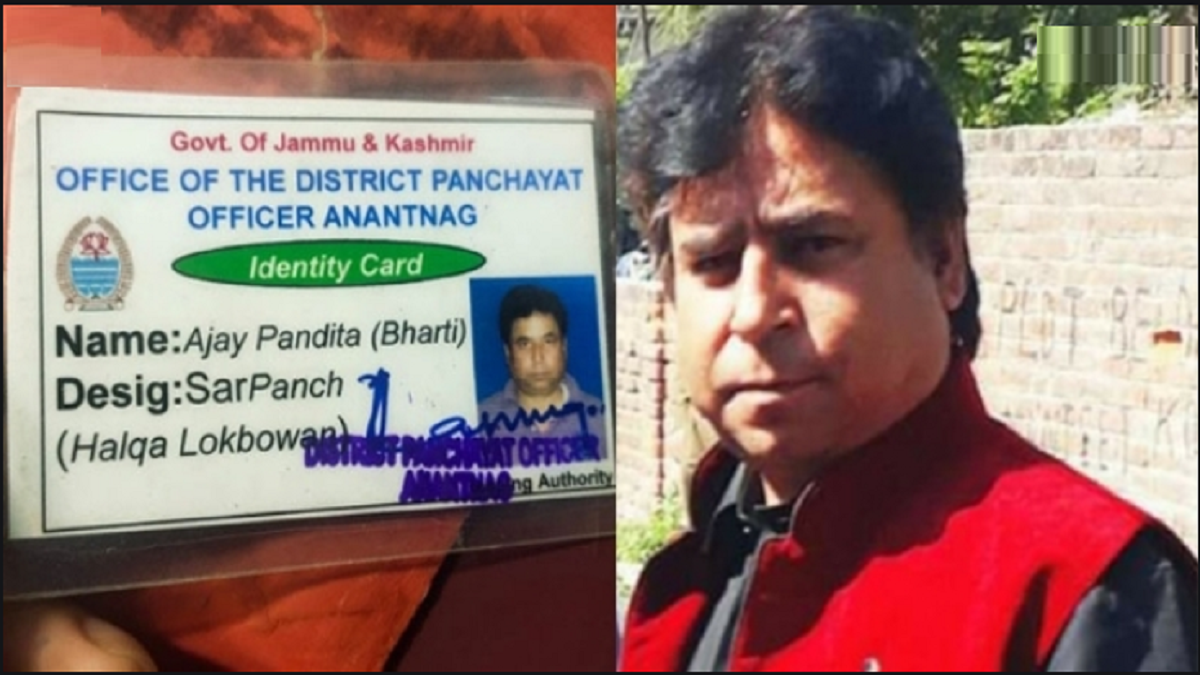As a Kashmiri, one obviously is enraged that an elected sarpanch was murdered in cold-blood by unidentified gunmen (a pet term for suspected terrorists). Not just because it was a Kashmiri Pandit murdered but also because an attempt at some semblance of democracy was murdered. Sarpanches are decision-makers, elected by the village-level constitutional body of local self-government called the Gram Sabha (village government) in India. The sarpanch, together with other elected panchayat members constitutes the gram panchayat, in which he is the focal point of contact between government officers and the village community and retains power for five years.
Over the years, 19 sarpanches have been murdered in Kashmir, Ajay Pandita being the latest. Not just that, a woman sarpanch within a week was videotaped in a kind of interrogation in an orchard, clearly being warned and made to resign as her pleas were being taped. Despite repeated requests, no security was provided for these upholders of democracy. Important to note in this is that there is an active war going on in the state, since 1989. Subsequent events have made it very clear from day one that pro-India voices and figures need security and open support of the state/government. At times certain individuals may ask for covert security, due to risk of coming into the crosshairs of the terror groups. These have to be indulged, as India needs a semblance of democracy on the ground.
Instead, we saw Z-security provided to soft separatist politicians, conflict entrepreneurs, and prosecession Hurriyat members. This appeasement of soft-separatism, mollycoddling of the “Old Establishment” exposed New Delhi’s knee-jerk reactions to events on the ground and the rush to quieten things with the numerous packages and offers for the Hurriyat to not chant Pakistan, and the mainstream parties to maintain a false India-patriotism for optics.
After the brutal murder of the sarpanch, the TRF (The Resistance Front, actually a front for the LeT and Hizbul Mujahideen) in the Valley has also issued a warning by putting up posters: “Do not be an informer and do not collaborate with India: Final warning by The Resistance Front to Kashmiri Pandits.” The poster has been issued by some Commander Hamza of the Resistance Front. The sarpanch killings and subsequent threats are aimed at terrorising the silent majority further into silence, and manufacturing a consent for jihad which the intifada factory, both overseas and domestic will then exhibit as all Kashmiris wanting secession from India. That has been the tactic in all the three decades of the Kashmir conflict.
What has New Delhi’s plan been to counter this? It is to be noted that many mainstream politicians have been locked up and released only recently. It dawned quite late on New Delhi that the root of the terrorism and corruption prevailing in the state stems from the long innings of these politicians and political parties. Yes, NC workers have been killed and targeted for belonging to the said party, but it is more for the party’s policies and perspective of it being an Indian puppet rather than the NC “holding the Indian flag high in the state”. The 1987 rigged elections keep propping up in a Kashmir debate, which enabled the first group of youth to crossover after being disillusioned of New Delhi, let’s not forget that.
Of course, detaining politicians without any charge sheet or case or trial is undemocratic, but this over-dependence on the “Old Establishment” has to go. Otherwise, as Albert Einstein observed, “The definition of insanity is doing the same thing over and over again, but expecting different results.” New blood needs to be brought in, and grassroots workers need to be protected; equal representation of Sikhs, Christians, Buddhists needs to be maintained in all political parties. Ex-Army men and retired servicemen can be brought in for the purpose of security of these sarpanches because they are the ones dealing with the overground workers of terror groups directly, often nefarious mafiastyled henchmen working both sides, like the ones threatening the woman in the video.
The sarpanches have been asking for protection since day one, and the communal angle notwithstanding, all of them are at high risk for even existing in their roles. Patriotism is the last refuge of the scoundrel, an often misinterpreted quote of Samuel Johnson does not hold on the subcontinent. The first generation politicians of new India after 1947, and in Kashmir after the Instrument of Accession, were spawned by the freedom struggle, which entailed considerable personal and professional sacrifice. Wrote Minhaz Merchant in his 1985 article ‘The First Refuge of Scoundrels?’: “Only men of mettle, who could make those sacrifices, were prepared to enter public life.”
For Kashmir, those lofty standards are still in place despite dynastic politics, when people like Ajay Pandita, despite the enormous risk, come forward to uphold democracy. New Delhi needs to make sure that those picking up the mantle from Ajay Pandita and others like him, should be well-protected and made to feel secure.
Arshia Malik is a writer, social commentator and educationist with a focus on conflict zones, especially South Asia.

